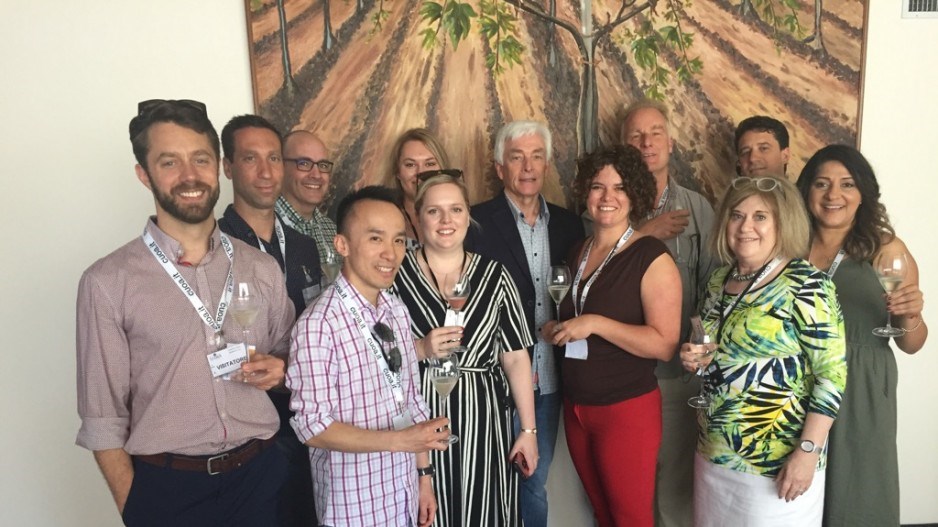When Tanya Mueller Smith attended the 10-day BCIT School of Business + Media’s Executive Field School in Italy, she got a lot of career-transforming answers. But just as important was a question she learned to ask: not just “Why?” but “Why not?”
“Experiencing how business works in another culture made me more open, more willing to reconsider unstated assumptions we have here in Canada,” explains Mueller Smith, now Manager, Member Relations & Sales Support with the Credit Union Executives Society (CUES).
“We would ask Italian businesspeople why they cooperated on this or that aspect of their company that we don’t here. They’d reply, ‘Why wouldn’t we cooperate? Why not?’”
At CUES, Mueller Smith supports credit union leaders through education and connection opportunities. “In my previous role, supporting collaboration initiatives, I signed up for the 2017 Executive Field School because I wanted to learn more about cooperative organizations in Italy, whose culture is particularly successful at that. With Canada being a young country, our credit unions have been around for a comparatively short while. In Italy, the culture of cooperation has existed for centuries.”
You do learn from a classroom course or a webinar, says Mueller Smith, but you get so much more when, as well as being given information, you’re immersed in the real-life practice of it. “I found it eye-opening how diverse cooperatives can be. In Italy, everything from Prosecco to agriculture, to salads and juices, to book-printing and childcare, is run cooperatively.”
On a visit to the Prosecco region, Mueller Smith and her cohort learned how the world-famous sparkling white wine grew from a small, family-owned start-up. And what is wine without cheese? They also visited the small mountain town of Asiago. In both cases, “we got to see every step and every single component of the process: what goes into the product and how it is made. With the farmers and producers, with those who work in the fields, we talked about how the cooperatives work, every component down to the sales. I had never seen cooperatives with such a level of complexity.”
Networking, C-suite style
Also key to the Executive Field School experience: networking with fellow participants. “You’re meeting people in leadership roles outside of the formal, office environment,” says Mueller Smith. “You’re talking with them in an everyday setting–when they’re eating, walking, travelling, sharing spontaneous thoughts with you—it’s all far beyond what you would get at a standard professional event or networking opportunity. And the relationships you build are deep and lasting.”
Executive Field School participants are unique, says Mark Nakamura, Program Head, Graduate Certificate in Global Leadership, BCIT. “These are people at the top of their game, professionals at the highest level. As C-suite executives, their growth has to do with networking with colleagues across Canada, learning more about their profession in different contexts and learning within a cooperative. Very different from a student Field School where participants haven’t travelled much and are just starting on their path of career and personal growth.”
Nakamura compares the Executive Field School to doing an executive MBA. Content is important, yes, but so are the people participating in the program. “This is an opportunity where you are working, learning and experiencing with people at the same career stage.”
Field schools are the epitome of applied education, Nakamura believes. “The traditional approach is passive: you’re sitting in a lecture, listening. The Field School approach is very active. You have learning in a classroom, but you also get experiential learning. You’re experiencing it by looking, touching, feeling, asking questions, discussing; by seeing different contexts and perspectives.”
Rather than peering through the familiar lens of how to do business, a Field School participant gets a chance to see through a foreign one. “This helps them come up with out-of-the-box thinking, applying different ways and practices. Understanding different perspectives is why we run field schools,” he says.
Executive Field School alum Mueller Smith concurs. “I’m a strong advocate of learning by immersion, by being plunked right down in midst of a new situation surrounded by learning opportunities—by the chance for incredible growth.”
A chance definitely worth toasting with a glass of Prosecco.
Interested in the BCIT Executive Field School program? The 2023 program takes place June 4-10 in Bologna, Emilia-Romagna region, Italy. Learn more.




